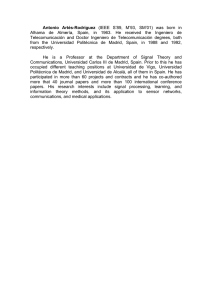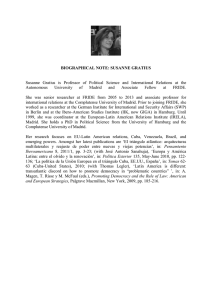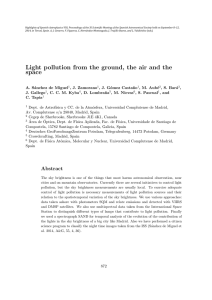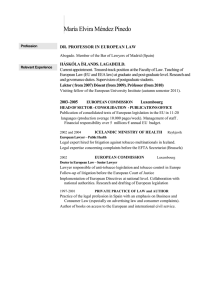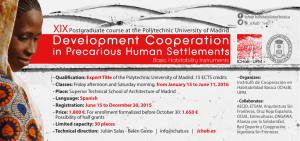Versatile strategy for the synthesis of biotin
Anuncio
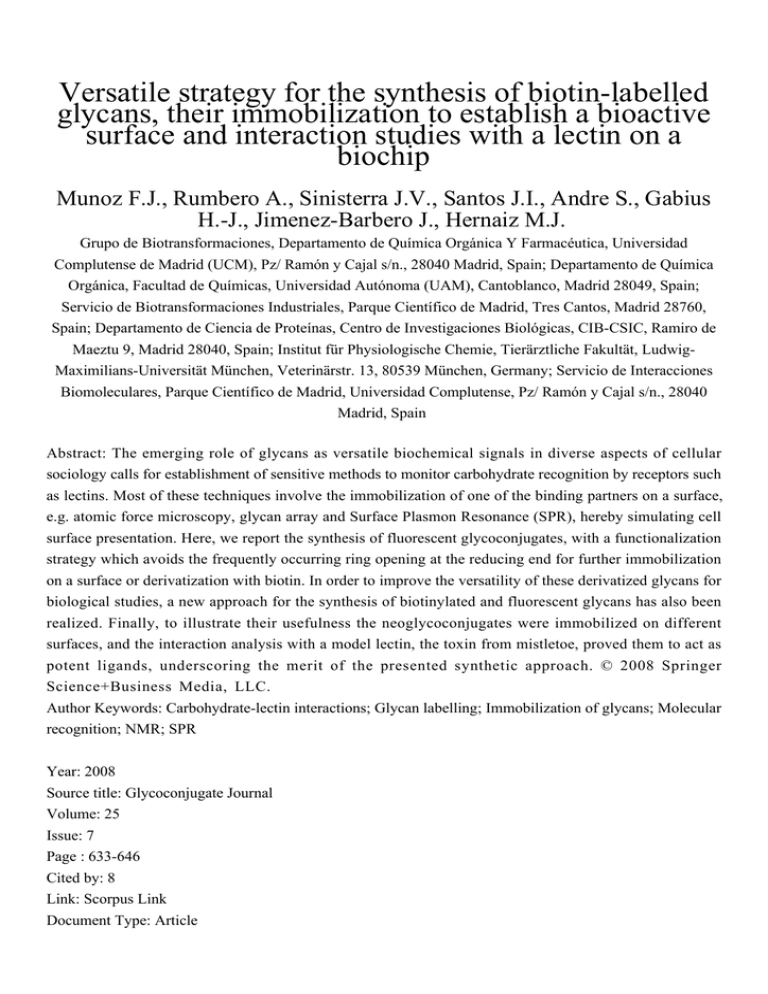
Versatile strategy for the synthesis of biotin-labelled glycans, their immobilization to establish a bioactive surface and interaction studies with a lectin on a biochip Munoz F.J., Rumbero A., Sinisterra J.V., Santos J.I., Andre S., Gabius H.-J., Jimenez-Barbero J., Hernaiz M.J. Grupo de Biotransformaciones, Departamento de Química Orgánica Y Farmacéutica, Universidad Complutense de Madrid (UCM), Pz/ Ramón y Cajal s/n., 28040 Madrid, Spain; Departamento de Química Orgánica, Facultad de Químicas, Universidad Autónoma (UAM), Cantoblanco, Madrid 28049, Spain; Servicio de Biotransformaciones Industriales, Parque Científico de Madrid, Tres Cantos, Madrid 28760, Spain; Departamento de Ciencia de Proteínas, Centro de Investigaciones Biológicas, CIB-CSIC, Ramiro de Maeztu 9, Madrid 28040, Spain; Institut für Physiologische Chemie, Tierärztliche Fakultät, LudwigMaximilians-Universität München, Veterinärstr. 13, 80539 München, Germany; Servicio de Interacciones Biomoleculares, Parque Científico de Madrid, Universidad Complutense, Pz/ Ramón y Cajal s/n., 28040 Madrid, Spain Abstract: The emerging role of glycans as versatile biochemical signals in diverse aspects of cellular sociology calls for establishment of sensitive methods to monitor carbohydrate recognition by receptors such as lectins. Most of these techniques involve the immobilization of one of the binding partners on a surface, e.g. atomic force microscopy, glycan array and Surface Plasmon Resonance (SPR), hereby simulating cell surface presentation. Here, we report the synthesis of fluorescent glycoconjugates, with a functionalization strategy which avoids the frequently occurring ring opening at the reducing end for further immobilization on a surface or derivatization with biotin. In order to improve the versatility of these derivatized glycans for biological studies, a new approach for the synthesis of biotinylated and fluorescent glycans has also been realized. Finally, to illustrate their usefulness the neoglycoconjugates were immobilized on different surfaces, and the interaction analysis with a model lectin, the toxin from mistletoe, proved them to act as potent ligands, underscoring the merit of the presented synthetic approach. © 2008 Springer Science+Business Media, LLC. Author Keywords: Carbohydrate-lectin interactions; Glycan labelling; Immobilization of glycans; Molecular recognition; NMR; SPR Year: 2008 Source title: Glycoconjugate Journal Volume: 25 Issue: 7 Page : 633-646 Cited by: 8 Link: Scorpus Link Document Type: Article Source: Scopus Authors with affiliations: 1. Muñoz, F.J., Grupo de Biotransformaciones, Departamento de Química Orgánica Y Farmacéutica, Universidad Complutense de Madrid (UCM), Pz/ Ramón y Cajal s/n., 28040 Madrid, Spain 2. Rumbero, Á., Departamento de Química Orgánica, Facultad de Químicas, Universidad Autónoma (UAM), Cantoblanco, Madrid 28049, Spain 3. Sinisterra, J.V., Grupo de Biotransformaciones, Departamento de Química Orgánica Y Farmacéutica, Universidad Complutense de Madrid (UCM), Pz/ Ramón y Cajal s/n., 28040 Madrid, Spain, Servicio de Biotransformaciones Industriales, Parque Científico de Madrid, Tres Cantos, Madrid 28760, Spain 4. Santos, J.I., Departamento de Ciencia de Proteínas, Centro de Investigaciones Biológicas, CIB-CSIC, Ramiro de Maeztu 9, Madrid 28040, Spain 5. André, S., Institut für Physiologische Chemie, Tierärztliche Fakultät, Ludwig-Maximilians-Universität München, Veterinärstr. 13, 80539 München, Germany 6. Gabius, H.-J., Institut für Physiologische Chemie, Tierärztliche Fakultät, Ludwig-Maximilians-Universität München, Veterinärstr. 13, 80539 München, Germany 7. Jiménez-Barbero, J., Departamento de Ciencia de Proteínas, Centro de Investigaciones Biológicas, CIB-CSIC, Ramiro de Maeztu 9, Madrid 28040, Spain 8. Hernáiz, M.J., Grupo de Biotransformaciones, Departamento de Química Orgánica Y Farmacéutica, Universidad Complutense de Madrid (UCM), Pz/ Ramón y Cajal s/n., 28040 Madrid, Spain, Servicio de Interacciones Biomoleculares, Parque Científico de Madrid, Universidad Complutense, Pz/ Ramón y Cajal s/n., 28040 Madrid, Spain
